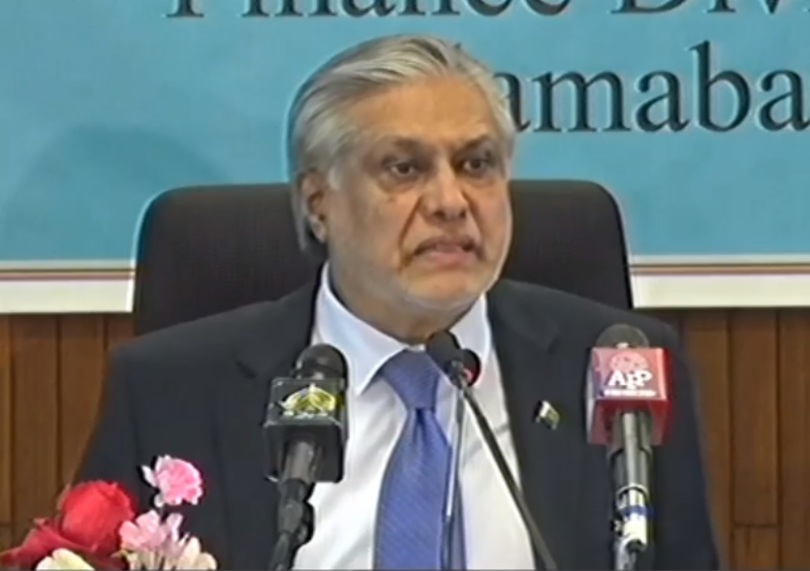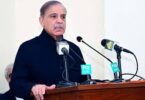ISLAMABAD (APP): Launching the important pre-budget document of ‘Pakistan Economic Survey 2022-23’ on Thursday, Federal Minister for Finance and Revenue, Senator Mohammad Ishaq Dar said restoring macroeconomic stability was the top priority of the incumbent government.
Addressing the survey launching press conference, the minister said the national economy suffered huge damages during the PTI government’s four-year rule, which dragged it to the brink of collapse. The launching ceremony among others was attended by Federal Minister for Planning, Development and Special Initiatives, Professor Ahsan Iqbal, Minister of State for Finance Dr Aisha Ghaus Pasha and senior officers.
“Our condition is that the economy of Pakistan that was the 24th big economy [of the world] in 2017, unfortunately, it became the 47th economy in 2022,” he said while stating the condition of the economy in one sentence. “Our objective is to restore macroeconomic stability,” the minister said, adding there was a dire need to put the economy on the path of progress at a fast pace, and the government would “try to get the same pace of national growth as was witnessed in 2017.”
Initially, he said the government first wanted to take the national economy to the position of 2017 and then lead it towards further development and get it included in the G20 premium group, an opportunity that was lost due to unwise policies of the previous government. He said along with macroeconomic stability, the government intended to put the economy on an inclusive and resilient growth trajectory and ensure its sustainability.
He said the incumbent government assumed power in 2022 at a time when the economy was on the brink of collapse. So, the government had to face huge challenges, including shrinking fiscal space, inflation, and current account deficit, whereas financing needs were growing, he added. “Had the incumbent government not taken power at this crucial juncture, the situation for Pakistan would have been worst,” Dar said.
The finance minister said the incumbent government, under the dynamic leadership of Prime Minister Shehbaz Sharif, took tough decisions to recover the ailing economy by giving priority to “the state over politics,” following which things had started moving in the right direction. Ishaq Dar said the biggest challenge for the government was to manage the external account, which was under control now.
“I have faith in the Almighty and we are also trying our best to make improvement and the decline in the economic growth has stopped now,” he added. The minister said the current coalition government, which got only 14 months to serve, had inherited the economy in the worst condition, and with damaged credibility, no one was ready to make any deal with it. However, he said, by paying political cost, the coalition government managed to save the country from default. Despite all constraints, the gross domestic product (GDP) growth rate was recorded at 0.29% in the outgoing fiscal year.
The current government, he said, made all structural reforms in various sectors, including power and gas sectors, fiscal and the Research on Improving Systems of Education (RISE) programme that were pending for several years. “These were the reforms in which the last government could not even take any prior action.” After completing the due reforms in RISE programme, he added, Pakistan would also immediately receive $450 million from the World Bank and $250 million from the Asia Infrastructure Investment Bank once the International Monetary Fund (IMF) programme was resumed.
The finance minister said the Consumer Price Index (CPI) based inflation stood at 29.2% during the first 10 months of the during the outgoing fiscal year. However, he added, the core inflation during the said period was 16% in urban areas and 20% in rural areas. He said the Federal Board of Revenue’s (FBR) tax collection witnessed a growth of 16.1% in first 11 months of the current fiscal year as it increased from Rs 5,348 billion in the corresponding months of the previous fiscal year to Rs 6,210 billion.
Highlighting the FBR’s efforts in broadening of the tax base, the minister said the Board had registered 912,394 new taxpayers by March 31 against the target of 700,000. He said the primary deficit of Rs 890 billion during the last year’s 10 months had now turned into surplus of Rs 99 billion while the current account deficit during July-April 2022-23 witnessed an improvement of 76% as it reduced from $13.7 billion last year to $3.3 billion. Ishaq Dar said global scenario on the economic front had also dented Pakistan’s progress during last few years as the average global GDP growth of 6.2% in 202-21 fell to 2.8% and global inflation increased also by 85% from 4.7% in 2021 to 8.7% in 2022.
Similarly, he said, the global trade growth also reduced by 5 times from 9.4% in 2021 to 1.7% in 2023.
Furthermore, he said, Pakistan also witnessed unprecedented floods last year. According to the international survey, the country incurred total losses of over $30 billion. He added that efforts were underway to build the damaged infrastructure in the flood hit areas and the planning minister and his ministry were actively working in that regard.
With respect to the dollar exchange rate, the minister said it seemed that some hidden hands were involved in keeping the Pakistani rupee under valued artificially. When he took over the charge of the Finance Ministry, the dollar plunged to Rs 217 in a single day but the price reversed mysteriously. However, he once again warned the hoarders to bring the dollars in market as its price was going to fall very soon. He said the PKR was undervalued by at least Rs 45 per dollar.
He also urged the media to play its role in creating awareness among the masses in that regard. The minister said during the last year, the government had repaid around $6.5 billion public debts out of which $5.5 billion were non-sovereign debts and $1 billion was bonds payment. Highlighting the government’s performance during the last year, Ishaq Dar said the government increased the BISP (Benazir Income Support Programme) stipend from Rs 360 billion to Rs 400 billion and 25% monthly stipend to each beneficiary was also increased in January this year.
Similarly, he said Rs 75 billion Ramazan Relief Package was also announced for the deserving families. Out of the Rs 2,000 billion Kissan Package, Rs 1,750 billion agriculture credit had been disbursed so far, he added. He said a decision regarding barter trade with Iran, Afghanistan and Russia had also been taken, which would help improve the current account balance of Pakistan.
According to the Economic Survey 2022-23, the agriculture sector’s performance was hit hard by flash floods 2022 that negatively impacted Kharif crops. The sector grew by 1.55% against the last year’s growth of 4.27%. Large Scale Manufacturing (LSM) growth during Jul-Mar FY2023 declined by 8.11% as compared to growth of 10.6% in the same period last year.
Similarly the fiscal deficit reduced to 4.6% of GDP (Rs 3,929.3 billion) during Jul-Apr FY2023 against 4.9% of GDP (Rs.3,275.2 billion) in the same period of last year. Net Domestic Assets (NDA) of the banking sector increased by Rs 4,098.6 billion during the period 1st July-12th May FY2023 as compared to Rs 2,889.1 billion during the same period of last year. The government’s borrowing for budgetary support stood at Rs 3,043.3 billion during the period 1st July-12th May, FY2023 as compared to Rs 1,570.0 billion during the same period of last year.
Likewise, the KSE-100 index of Pakistan opened at 41,540.8 points on 1st July 2022 and closed at 40,000.8 points on 31st March 2023, declined by 3.7% during Jul-Mar FY2023. Exports declined by 11.7% during Jul-Apr FY2023 amounting to US$ 23.2 billion as compared to US$ 26.2 billion in the same period of last year on account of the weak global demand and lackluster performance in the domestic economy amid the demand curtailing measures.







